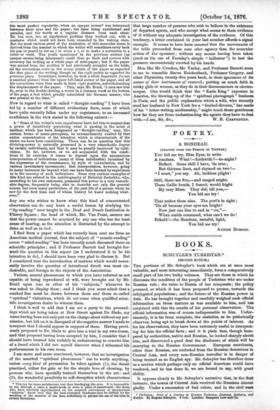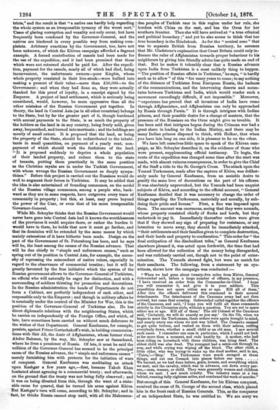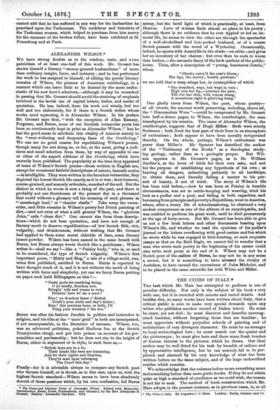BOOKS.
THE portions of Mr. Schuyler's book which are at once most valuable, and most interesting immediately, form a comparatively small part of his two bulky volumes. They are those in which he discusses the condition of the people of Turkistan who are under Russian rule ; the value to Russia of her conquests ; the policy pursued, or which it has been proposed to pursue, towards the subjugated populations ; and the future of the Russian power in Asia. He has brought together and carefully weighed such official information on those matters as was available to him, and has conjoined with this the results of his personal observation. The official information was of course indispensable to him. Unfor- tunately, it is far from complete, the statistics, as he pathetically observes, being apt to break down at the points of interest. As for his observations, they have been extremely useful in interpret. ing for him the official facts ; and it is plain that, though ham- pered by authorities, native and Russian, he looked sharply about him, and discovered a good deal the disclosure of which will be annoying to the Russian Government. European merchants, other than Russian, are excluded from the Russian dominions in Central Asia, and every non-Russian traveller is in danger of being treated as an English spy. Mr. Schuyler has therefore done us a service which perhaps only an official American could have rendered, and he has done it, we are bound to say, with great ability.
It appears clearly in Mr. Schuyler's narrative that, in the first instance, the towns of Central Asia received the Russians almost gladly. Under a succession of bad rulers, and in the civil wars * Turkistan: Notes of a Journey in Russian Turkistan, K5okant4 Bukhara, and Stadia. By Eugene Schuyler, 2 vols. London: Sampson Low and 00. which their misrule occasioned, the people had suffered almost intolerably ; and in submitting to Russia, they reckoned at least on safety for life and property, respect for family ties, security against capricious cruelty and against exactions without rule or limit. The Russians do not butcher their subjects as the Khans did, and in some cases they have lowered the taxes ; but, driven to shifts for raising money, they have invented new taxes and greatly in- creased some existing ones, while the officials, badly paid as in Russia itself, eke out their incomes by extortion. The Turkistan farmer is not yet so heavily taxed as the Russian peasant is— which many of the officials hold he should be—but he has to pay much more than he did some years ago, and year after year a greater amount,—and that, be it remembered, to a foreign Govern- ment. On the other hand, except that summary executions have Ceased, it is not easy to see what he has gained by the change of rulers ; and those—besides that they are perhaps forgotten— coming at uncertain times, and lighting upon a few, had never formed in the popular estimation an evil comparable with un- warrantable exactions. Mr. Schuyler, though not very confidently, thinks the change of rule has been, on the whole, beneficial ; but it is clear that the people are not of this opinion, and the new _ estimation formed of Russian government bas made itself felt in the strenuous resistance offered to the Russians in the subjugation of Khokand. Their former conquests, made with the good-will of the native populations, had been accomplished with almost incredible ease. The savage cruelties with which (since Mr. Schuyler's visit) the resistance of the Khokandians was punished, and the almost incredibly barbarous treatment of the omud Turkomans, may have spread terror through Central Asia, but they can hardly have failed to turn discontent with the Russian Government into bitter animosity. Before these events, as Mr. Schuyler tells us, it was only by military force that the Russian domination was maintained ; without a large army, he says, it would not have lasted a week. This is not surprising, considering how recently the Russian conquests had been made,—what is to be noted is that dissatisfaction with Russian government had been increasing with experience of it. Other matters than the burden of taxation have conduced to this. The demand made by the advent of the Russians upon the scanty supplies of the country has greatly raised the price of some necessaries, and especially that of wheat, so that the people have to pay more in order to live, as well as to pay more to the Govern- ment. And in an extract which Mr. Schuyler makes from a work by a Russian officer we have a hint of grievances of a more exasperating kind. "How are the Russians better for us than the Khokandians ?" the Russian officer makes a native inquire. 14 They also take away from us our wives and daughters, and also love presents, and have wasted the money of the Tsar as the Beks wasted that of the Khans." This authority adds that the civi- lising mission of Russia has been signalised up to this time only by the introduction of paper-money into the country, and the statement, so far as we can gather, is not a very exaggerated one. It has unfortunately happened that Turkistan has been made a plasm of refuge for officers, civil and military, who had, through bad character or extravagant habits, or mere incapacity, made themselves impossible at home, and the natural consequence of this has been that the people have been neglected, and mis- governed, and plundered.
Possessions which have to be held with 40,000 soldiers ought to be valuable to be worth having, but Mr. Schuyler shows that Turkistan is somewhat of a burden to Russia, a drain upon her Treasury, and through this, and the drain which the army of occupation makes upon her military strength, a source of positive weakness to her. Daring the five years 1868-72 the yearly deficits of the Turkistan balance-sheet mounted up to nineteen million roubles, not counting the cost of articles made for the army in Russia ; and the deficit for the year 1873 is put by Mr. Schuyler at over seven million roubles, or nearly a million sterling. Counting in articles supplied from Russia, the ex- penditure for 1872 seems to have been about eight million roubles; while the income was barely two million roubles, and a full third of that, being dues levied on goods in transit to Russia, was paid by the Russians themselves. If the yearly deficit is to be diminished too, clearly it must be by reducing the expenditure— and that is very wasteful, there being far too many officials, and the commissariat being enormously costly—rather than by increasing the revenue. The truth is the country, though the Russians had regarded it aa a land of promise, is extremely poor, and that such resources as it has can only be developed at great expense. Excluding the province of Kuldja, Q f whiett the resources, agricultural and mineral, are very con- • siderable—since, besides that it is outside Central Asia, it is, in theory at least, being held for the Chinese—and not counting in Central Asia the Kyzil-Kum sands, only 1.6 per cent, of the Russian territory is fit for cultivation ; much of that is unculti- vated, and much more would be worthless without irrigation ; and the habitable districts are separated from each other and from the outer world by wastes which make intercommunication difficult, being, in fact, only large oases occurring in an immense expanse of desert. The population, including that of Kuldja, being, on what Mr. Schuyler thinks a sanguine estimate, two' millions and a half, the area of the territories lately acquired by Russia is equal to that of the Austrian Empire, Germany, and Belgium, taken together ; and their resources may in some degree be gauged by the fact that the addition of at most 100,000 Rus- sians has, within a few years, more nearly trebled than doubled the price of wheat and other grains. There is coal, but—except in Knldja—it is not abundant, and the quality is not good. The cotton—which forms nearly a fifth of the Russian supply of cotton, about twenty-five million pounds—is said to be worse than Surat, and there is much waste, through the careless way in which it is- sent to market. Silk also is a product of the country, but the production somehow languishes, notwithstanding that the climate- is most favourable. Improved communications, which might do much for such industries, can only be had at a vast expense, and if ever made, will be made for military and not for commercial reasons. The obstacles to the navigation of the Syr-Darya have hitherto proved insurmountable, and the great project of M. Lesseps—a railway through Central Asia, connecting Europe with India—seems at present an inspiration from Utopia. Some railway project does seem to be contemplated by the Russian Government, and within a few days it has been stated that coal is being worked at Tchimkent in connection with it ; but even this must be the merest project, and probably the scale of the- coal-working at Tchimkent has not been materially enlarged. The roads, however, have been greatly improvedsand bridges have been constructed over the chief rivers. Except to this extent, Russia as yet has done little or nothing for the development of the native industries, though, especially as regards silk and cotton, a good deal might have been done. What the private enterprise of Russians has done, too, has been without beneficial influence on them, while it has been almost invariably ruinous to those en- gaged in it, chiefly because of the illusory hopes of rapid fortune- nuking in which such enterprise has mostly had its motive All things considered, it is rather surprising that by 1875 the Bssasians had forced up their estimate of revenue from two to two, and a half million roubles, and until they have done something for the advancement of the country, it is not likely that they can raise much more than that. The trade of Russia with Central Asia, including the transit trade with regions more remote, thou& jealously guarded from foreign competition, is much too small to make up to Russia the losses which she sustains on her adminis- tration. Taking imports and exports together, Mr. Schnyler- estimates it at no more than two millions sterling, and he is or opinion that, partly owing to the commercial policy of Russia, it has of late years been falling off.
The Russians manage to mix more freely with their new subjects than the English have ever done with the populations of India ; and
where they fail in this, it is the natives who hold aloof from the Russians, rather than the Russians from the natives ; but they have been much too hasty in introducing European methods of govern- ment. It has already been shown that, in some most important matters, popular election has been resorted to, and with no benefi- cial results. It has been used in the filling-up of the Councils an& Regencies which are supposed to assist the officials in the govern- ment of districts, as well as in the appointment of Judges, and while it is, in fact, selection in disguise, and the elected members of the Councils and Regencies are really powerless, its operation puts the Russians to a great extent under the guidance of un- scrupulous native advisers. In the main, the Russians have attempted to assimilate the government of Turkistan to that of an ordinary Russian province, and though this in the long-run must have been done, the attempt, prematurely made upon a population inveterately attached to customs and administrative methods of native growth, has worked oppressively, and been keenly resented. Then changes are constantly being made, both by governors and by prefects, in the regulations, especially in those- relating to the taxes; and the carrying-out of those regulations is in the hands of officials who, with great respect for modes of procedure, overstep the law—as, indeed, officials do in Russia— whenever it suits them to do so. "This arbitrary action and these administrative methods are seldom alike in two adjoining dill- tricts," and the result is that "a native can hardly help regarding -the whole system as an irresponsible tyranny of the worst sort." Vases of glaring corruption and venality not only occur, but have frequently been condoned by the Governor-General, and the -natives are hindered in every possible way from making com- plaints. Arbitrary exactions by the Government, too, have not been unknown, of which the Khivan campaign afforded a flagrant example. A forced contribution of camels had been made for the use of the expedition, and it had been promised that those which were not returned should be paid for. After the expedi- tion, payment for the camels, nearly all of which had died, being inconvenient, the unfortunate owners—poor Kirghis, whose whole property consisted in their live-stock—were bullied into making a present of their value—more than /50,000—to the 'Government ; and when they had done so, they were actually thanked for this proof of loyalty, in a rescript signed by the Emperor. A project of land settlement, which is seriously being considered, would, however, be more oppressive than all the other mistakes of the Russian Government put together. In theory, the land in Central Asia (as in all other countries) belongs -to the State, but by far the greater part of it, though burdened with annual payments to the State, is as much the property of the holders as the land is in any country, being freely sold, given away, bequeathed, and turned into mortmain ; and the holdings are mostly of small extent. It is proposed that the land, as being the property of the State, should be redistributed to the inhabi- tants in small quantities, on payment of a yearly rent, non- payment of which should work the forfeiture of the land. -"It is proposed suddenly to deprive a whole population of their landed property, and reduce them to the state of tenants, putting them practically in the same position as the Christian rayahs are in under the Turkish Government, with whose wrongs the Russian Government so deeply sympa- thises." Before this project is carried out the Russians would do well to augment their forces in Turkistan. It may be added that the idea is also entertained of founding communes, on the model of the Russian village communes, among a people who, back- ward as they are in some respects, have outgrown every trace of community in property ; but this, at least, may prove beyond -the power of the Czar, or even that of his more irresponsible Governor-General.
While Mr. Schuyler thinks that the Russian Government would -never have gone into Central Asia had it known the worthlessness of the provinces it could acquire there, or rather the burden it would have in them, be holds that now it must go farther, and that its dominion will be extended by the same means by which mainly extensions of it have hitherto been made. Design on the part of the Government of St. Petersburg has been, and he says will be, the least among the causes of the Russian advance. That will be due chiefly to "simple and unforeseen causes," such as spring out of its position in Central Asia, for example, the neces- sity of repressing the misconduct of native rulers, especially in regard to the observance of commercial treaties ; but it will be greatly favoured by the free initiative which the system of the Russian government allows to the Governor-General of Turkistan, an official who will naturally be eager for distinction, and with a surrounding of soldiers thirsting for promotion and decorations. In the Russian administration the heads of Departments do not form a Cabinet, are perfectly independent of each other, and responsible only to the Emperor ; and though in military affairs he is nominally under the control of the Minister for War, this is the position of the Governor-General of Turkistan also. He has direct diplomatic relations with the neighbouring States, which he carries on independently of the Foreign Office, and which, of late, have sometimes been carried on without much deference to -the wishes of that Department. General Kaufmann, for example, persists, against Prince Gortschakoff's wish, in holding communica- tions with Shir Ali, the Amir of Affghanistan, whose former rival, Abdur Rahman, by the way, Mr. Schuyler saw at Samarkand, where he lives a pensioner of Russia. Of late, it must be said the volition of the Governor-General has seemed to be the principal cause of the Russian advance, the "simple and unforeseen causes" merely furnishing him with pretexts for the initiation of wars of conquest. General Kaufmann was meditating an attack upon Kashgar a few years ago,—first, because Yakub Khan hesitated about agreeing to a commercial treaty ; and afterwards, on the ground that the treaty was not being fully observed ; and it was on being diverted from this, through the want of a state- able cause for quarrel, that he turned his arms against Khiva. But Kashgar's turn will come, according to Mr. Schuyler; and in fact, he thinks Russia cannot stop until, with all the Mahomme-
dan peoples of Turkish race in this region under her rule, she borders with China on the east, and has the Oxus for her southern frontier. Then she will have arrived at " a true ethnical and political boundary ;" and yet he also seems to think that her true boundary is the Hindukush. As for the "neutral zone" that was to separate British from Russian territory, he assumes that Mr. Gladstone's explanation that Great Britain could only in- fluence the ruler of Affghanistan towards proper behaviour to his neighbours by giving him friendly advice has quite made an end of that. But he makes it tolerably clear that a Russian advance upon India from Turkistan is a most unlikely thing to happen. "The position of Russian affairs in Turkistan," he says, "is hardly such as to allow" of this "for many years to come; to say nothing of the distance of Turkistan from European Russia, the badness of the communications, and the intervening deserts and moun- tains between Turkistan and India, which would render such a movement exceedingly difficult, if not impossible." Moreover, "experience has proved that all invasions of India have come through Affghanistan, and Affghanistan can only be approached by Russia through Persia." It is through intrigues with Indian princes, and their possible desire for a change of masters, that the presence of the Russians on the Oxus might give us trouble. It has been said that intrigues begun during the Crimean war had a great share in leading to the Indian Mutiny, and there may be many Indian princes disposed to think, with Holkar, that when you have lain long on one side, it is pleasant to lie on the other.
We have left ourselves little space to speak of the Khivan cam- paign, as Mr. Schuyler describes it, on the evidence of those who were present, supplementing official testimony. To begin, the
route of the expedition was changed some time after the start was made, with almost ruinous consequences, in order to give the Chief of the Staff a title to the St. George's Cross. The attack upon the Yomud Turkomans, made after the capture of Khiva, was deliber-
ately made by General Kaufmann, from an amiable desire to gratify the same love of decorations on the part of his officers. It was absolutely unprovoked, but the Yomuds had been unquiet subjects of Khiva, and according to the official account, "General Kaufmann decided that it was necessary to change the order of things regarding the Turkomans, materially and morally, by sub- duing their pride and license." First, a fine was imposed upon them. The amount was enormous, seeing that they were nomads, whose property consisted chiefly of flocks and herds, but they undertook to pay it, Immediately thereafter orders were given that if they showed any sign of preparing for resistance, or any intention to move away, they should be immediately attacked, "their settlements and their families given to complete destruction, and their herds and property to confiscation." This order for" the final extirpation of the disobedient tribe," as General Kaufmann elsewhere phrased it, was acted upon forthwith, the time that had been allowed for the collection of the money being disregarded, and was ruthlessly carried out, though not to the point of exter- mination. The Yomuds showed fight, but were no match for
their assailants. The following, from a statement by an eye- witness, shows how the campaign was conducted:— " When we had gone about twenty-five miles from Khiva, General Golovatchef said, before a large number of officers, in my presence, I have received an order from the Commander-in-Chief. I hope you will remember it, and give it to your soldiers. This expedition does not spare either sex or age. Kill all of them.' After this the officers delivered this command to their several detachments. The detachment of the Caucasus army bad not then arrived, but came that evening. Golovatchef called together the officers of the Caucasus, and said, 'I hope you will fulfil all these commands strictly in the Circassian style, without a question. You are not to spare either sex or age. Kill all of them.' The old Colonel of the Caucasus said, 'Certainly, we will do exactly as you say.' On the 7th, when we began to meet the Turkomans, these orders were again brought to mind, and nearly every one whom we met was killed. The Cossacks seemed to get quite furious, and rushed on them with their sabres, cutting everybody down, whether a small child or an old man. I saw several such cases. I remember one case in particular, which I could not look at for more than a moment, and rode hastily by. A mother, who had been riding on horseback with three children, was lying dead. The eldest child was also dead. The youngest had a sabr,e-cut through its arm, and while crying was wiping off the blood. The other child, a little older, who was trying-to wake up the dead mother, said to me, Tuira,'—' Stop.' The Turkomans were much enraged at these
things, and cut one Cossack into pieces before our eyes We burned, as we had done before, grain, houses, and everything which we met; and the cavalry, which was in advance, cut down every per- son,—man, woman, or child. They were generally women and children whom we met. I saw much cruelty. The infantry came at a run behind, running fully eighteen miles, and continued the work of murder."
But enough of this. General Kaufmann, for his Khivan conquest, received the cross of St. George of the second class, which placed him in the front rank of Russian Generals. This, as the conqueror of an independent State, he was entitled to. We are sorry we cannot add that he has suffered in any way for the barbarities he practised upon the Turkomans. The necklaces and bracelets of the Turkoman women, which helped to purchase from him mercy for the remnant of the broken tribes, have been exhibited at St. Petersburg and at Paris.





































 Previous page
Previous page